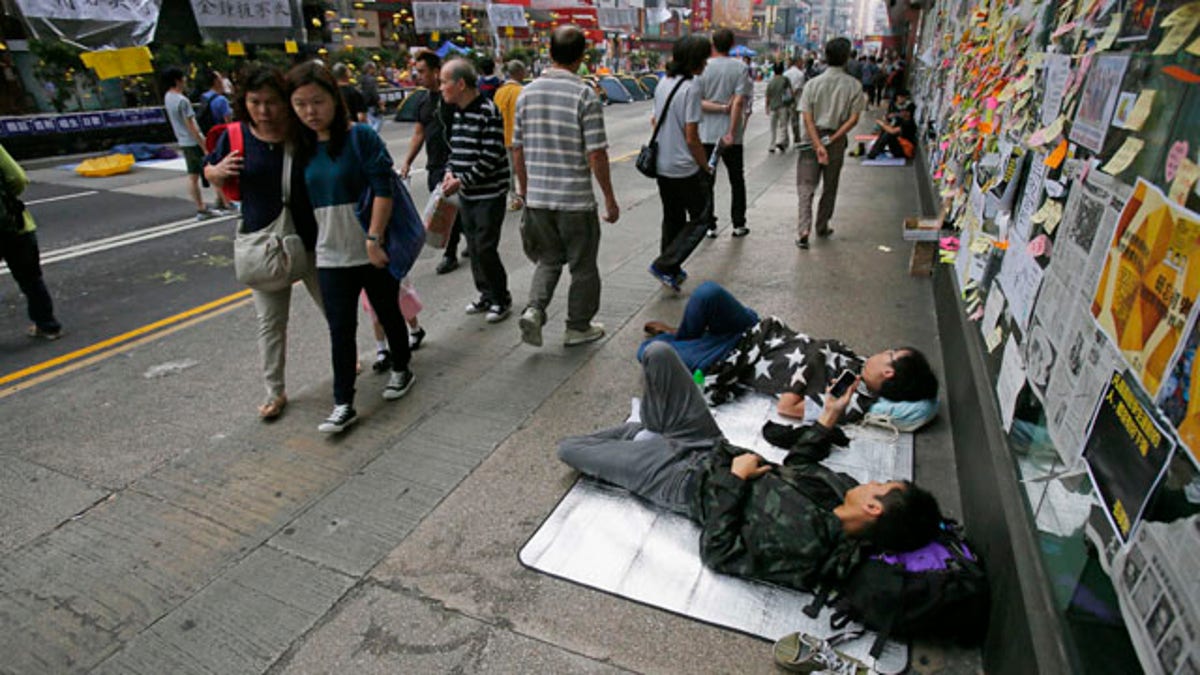
October 16, 2014: Pedestrians walk past sleeping pro-democracy students on an occupied street by the protesters in the Mong Kok district of Hong Kong. (AP Photo/Wally Santana)
Hong Kong's chief executive told reporters Thursday that he is ready to begin talks with pro-democracy demonstrators who have blocked city streets and battled with police for close to three weeks.
Leung Chun-ying said that government officials have been negotiating with the students through middlemen over the past few days, and authorities are now ready to hold talks on democratic reform as soon as next week.
There was no immediate response from the student leaders, and it was unclear whether the proposed meeting can overcome the vast differences between the two sides.
Many in Hong Kong were outraged after a group of police officers were caught on camera early Wednesday apparently beating a protester with his hands cuffed behind his back. The seven officers, who have been suspended, were among hundreds battling with activists for two nights in a row over control of a busy road next to city government headquarters and near the protesters' main occupation zone.
Tensions between the two sides have escalated in the past few days as riot police armed with pepper spray and batons moved to retake some occupied streets.
"As long as students or other sectors in Hong Kong are prepared to focus on this issue, yes we are ready, we are prepared to start the dialogue," Leung told reporters, adding that middlemen, whom he did not identify, had been in touch with student protest leaders to convey the government's wishes.
The protesters have taken over major roads and streets in business and shopping districts across the city since Sept. 28 to press for a greater say in choosing the semiautonomous Chinese city's leader in an inaugural direct election, promised for 2017.
Leung did not directly respond to questions about when police will move in to clear the sites, though he said that while authorities have tolerated the civil disobedience movement until now, it "cannot go on indefinitely."
"Going forward, we cannot allow the occupying of streets to have a negative impact on Hong Kong society. Police will use appropriate methods to deal with this problem," he said.
Protesters oppose the Chinese central government's ruling that a committee stacked with pro-Beijing elites should screen candidates in the territory's first direct election. That effectively means that Beijing can vet candidates before they go to a public vote.
Leung stressed that Beijing's position will not change but said there is scope for negotiations on how the committee that nominates candidates is formed.
"In the second round of consultation, we can still listen to everyone's views. There is still room to discuss issues including the exact formation of the nomination committee," he said.
China's central government has condemned the mostly peaceful demonstrations, the biggest challenge to its authority since China took control of the former British colony in 1997.
A front-page editorial Wednesday in the People's Daily, the ruling Communist Party's mouthpiece, said the protests "are doomed to fail." There were no signs, however, that Beijing was planning to become directly involved in suppressing them.
Earlier Thursday, police briefly scuffled with protesters, but held back from dismantling barricades erected by the activists.
Police used pepper spray again after midnight Thursday to push back crowds trying to occupy a road outside the government's headquarters. Police said two protesters were arrested, one for kicking a bottle at a private car and one for assaulting police, and three officers were injured.
The Associated Press contributed to this report.







































